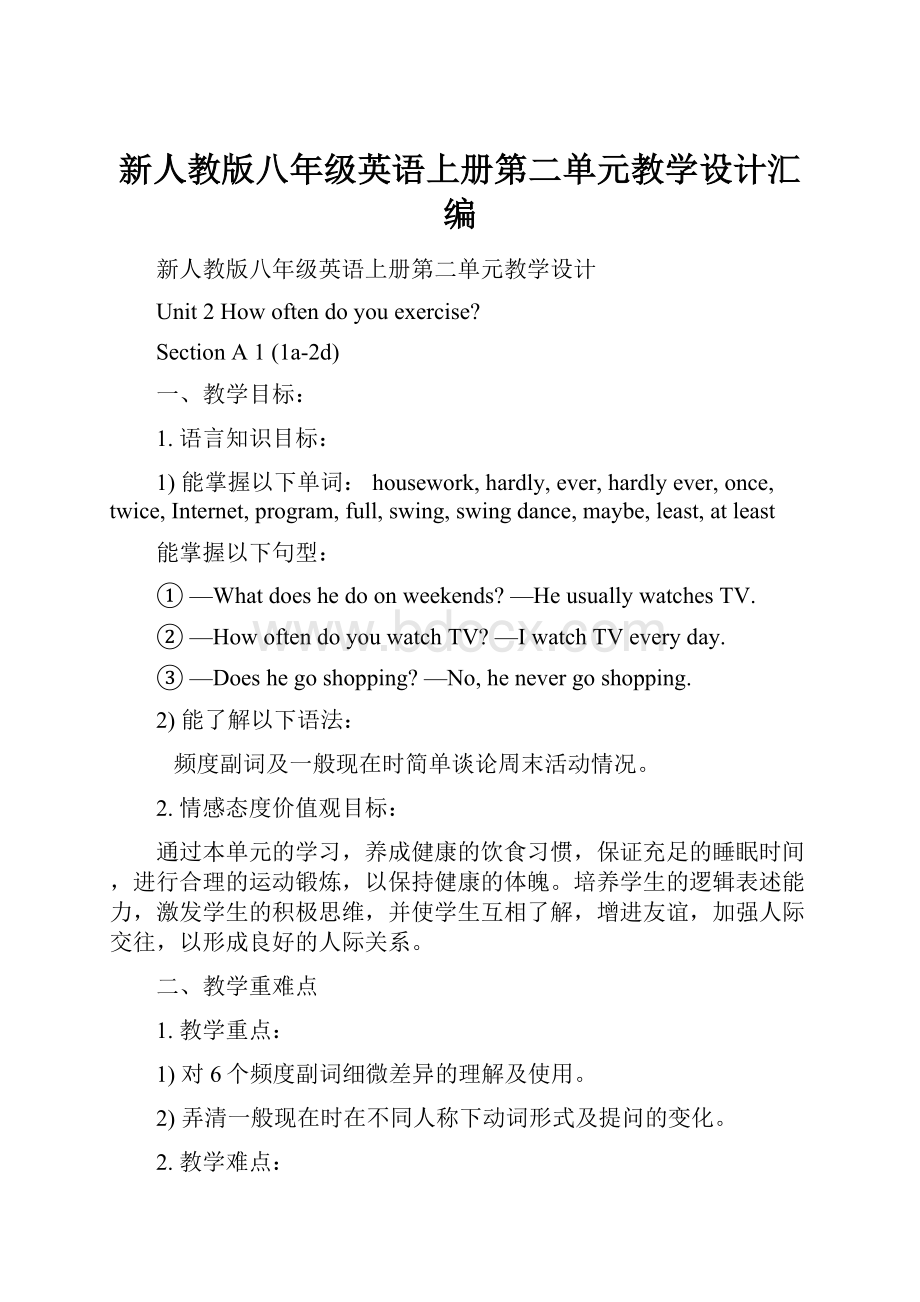新人教版八年级英语上册第二单元教学设计汇编.docx
《新人教版八年级英语上册第二单元教学设计汇编.docx》由会员分享,可在线阅读,更多相关《新人教版八年级英语上册第二单元教学设计汇编.docx(21页珍藏版)》请在冰豆网上搜索。

新人教版八年级英语上册第二单元教学设计汇编
新人教版八年级英语上册第二单元教学设计
Unit2Howoftendoyouexercise?
SectionA 1 (1a-2d)
一、教学目标:
1.语言知识目标:
1)能掌握以下单词:
housework,hardly,ever,hardlyever,once,twice,Internet,program,full,swing,swingdance,maybe,least,atleast
能掌握以下句型:
①—Whatdoeshedoonweekends?
—HeusuallywatchesTV.
②—HowoftendoyouwatchTV?
—IwatchTVeveryday.
③—Doeshegoshopping?
—No,henevergoshopping.
2)能了解以下语法:
频度副词及一般现在时简单谈论周末活动情况。
2.情感态度价值观目标:
通过本单元的学习,养成健康的饮食习惯,保证充足的睡眠时间,进行合理的运动锻炼,以保持健康的体魄。
培养学生的逻辑表述能力,激发学生的积极思维,并使学生互相了解,增进友谊,加强人际交往,以形成良好的人际关系。
二、教学重难点
1.教学重点:
1)对6个频度副词细微差异的理解及使用。
2)弄清一般现在时在不同人称下动词形式及提问的变化。
2.教学难点:
1)第三人称单数谓语动词在此核心句型中的运用。
2)谈论课余时间的各项活动,以及初步认识和使用频率副词。
三、教学过程
Ⅰ.Leadin
Talkaboutyourlastweekend’sactivities.
Ⅱ.Presentation
(1)教师问:
“Whatdoyouusuallydoonweekends?
”(并且板书)让学生根据自己的实际回答 Iusually……onweekends.
(2)教师出示动词卡片 watchTV,readbooks,exercise,swim,playfootball、goshopping、gotomovies让学生回答。
Ⅲ.Workon1a
1.Lookatthepicture.Discusswithyourpartners.Makealistoftheweekendactivities.
2.LetsomeSsreadouttheiractivities.LetotherSsaddmoreactivities.
Ⅳ.Workon1b
1.TellSstolistenandwritethelettersfromthepictureaboveonthelinebelow.
2.Playthetapeforthefirsttime.Sslistenandfillintheblanks.
3.PlaythetapeforthesecondtimefortheSstochecktheanswers.
Ⅴ.Workon1c
1.Actouttheconversationwithastudent.
2.LetSstalkaboutthepicturesin1ainpairs.
3.LetsomeSsactouttheirconversations.
Ⅵ.Workon2a,2b
1.LetSsreadthephrasesinthechart.
2.TellSsthatChengTaoistakingabouthowoftenhedoestheseactivities.Playtherecordingforthefirsttime.Sslistenandnumbertheactivities[1-5].
3.PlaytherecordingforthesecondtimefortheSstochecktheanswers.
Workon2b:
1.TellSstheywillheartherecordingagain.Thistime,listenandmatchtheactivitiesin2awithhowoftenChengTaodoesthem.
2.Sslistenandmaththeactivitieswiththephrases.
3.Checktheanswers.
Ⅶ.Workon2c
1.Askonestudenthowoftenhe/shewatchTVasamodel.
T:
Hi,S1.HowoftendoyouwatchTV?
S1:
IwatchTVeveryday.
T:
What’syourfavoriteprogram?
S1:
Animalworld.
T:
Howoftendoyouwatchit?
S1:
Twiceaweek.
2.Letonestudentreadtheactivitiesinthechart.Tellthemthesenewwords:
favoritewebsite(最喜欢的网站);favoritesport(最喜欢的运动)
3.Ssworkwiththeirpartners.Thenasksomepairstoactouttheirconversations.
Ⅷ.Role-play
1.Readtheconversationbythemselves,thenmatchtheactivitywiththerighttime.
Dancelesson Tuesday
PianolessonWednesdayandFriday
PlayingtennisMonday
2.LettheSsreadtheconversationafteryou.
3.Ssworkwithapartnerandactouttheconversation.Thenletsomepairstoactouttheconversationinfrontoftheclass.
IX. Languagepoints
1.hardly只用作副词,其意思是“几乎不”,表示否定概念,它常和can,could等连用,在句中位于动词be、情态动词或助动词之后、行为动词之前。
e.g.HecanhardlyspeakEnglish.他不太会说英语。
hardlyever 几乎从不
e.g.Peterishardlyeverlate.彼得几乎不迟到。
辨析:
hard也用副词,意为“努力地、刻苦地”,“猛烈地”。
e.g.Heworkshardonlybeforeexams.他只在考试前努力学习。
2.once,twice,threetimes等次数的表达法。
1)这三个词都表示____,once是____,twice是____,除了一次,两
次,其他的次数都表达___________。
如:
三次是__________,五次是_________。
次数,一次,两次;数字+times
threetimes,fivetimes
2)这些表次数的词后与一段时间连用,表示动作多长时间发生几次,即动作
的_____。
频率
3)翻译:
两周一次 ________________
一年两次 ________________
一个月两次 ________________
3.Hmm…nextweekisquitefullforme,Jack.
◆ full作形容词,可意为“忙的”,其同义词为busy。
如:
Hehadafullweekend.
◆ full还可意为“满的”,其反义词为empty(空的)。
如:
Therestaurantisfulleveryday.
◆ full还可意为“吃饱了的”,其反义词为hungry。
如:
I’mfull,soIdon’twanttoeatanything.
X.Exercises
Homework:
翻译句子
①周末你通常做什么事情?
我通常踢足球。
____________________________________
② 周末他们做什么事情?
他们经常去看电影。
___________________________________
SectionA2(GrammarFocus-3c)
一、教学目标:
1.语言知识目标:
1)复习运用频率词汇及询问活动频率。
2)一般现在时态的熟练运用。
2.情感态度价值观目标:
通过本单元的学习,养成健康的饮食习惯,保证充足的睡眠时间,进行合理的运动锻炼,以保持健康的体魄。
培养学生的逻辑表述能力,激发学生的积极思维,并使学生互相了解,增进友谊,加强人际交往,以形成良好的人际关系。
二、教学重难点
1.教学重点:
1)—Howoftendoyou/doeshe(she)….?
—Heusually…
2)频度副词的用法:
always;usually;often;sometimes;hardlyever;never
2.教学难点:
1)第三人称单数谓语动词在此核心句型中的运用。
2)能够谈论课余时间的各项活动,以及初步认识和使用频率副词。
三、教学过程
Ⅰ.Warming-upandrevision
1.Askandanswersomeoralquestionsonhowoftenexercise.
2.Checkthehomework.
3.AskSstorole-playtheconversationin2d.
Ⅱ.GrammarFocus
1. 学生阅读GrammarFocus中的句子,然后做填空练习。
1)你通常在周末做什么?
__________you_______doonweekends?
2) 我总是去运动。
I______________.
3)他们总是在周未做什么事情?
___________they________onweekends?
4)他们经常帮助做家务。
They_______________withhousework.
5)她在周未做什么?
What______she_______onweekends?
6)她有时候去购物。
She_________________________.
你多久去看电影一次?
__________doyougotothe_________?
7)我可能一个月去看一次。
Igotomovies_____________a________.
8)他多久看一次电视?
_____________doeshewatchTV
9)他几乎不看电视。
He_______________watchesTV.
10)他去购物吗?
_________goshopping?
11)不,他从不去购物。
No,he_____________shopping.
3.学生们完成填空试题后,可以打开课本检查答案,对错误的句子,单独进行强化记忆。
Ⅲ.TrytoFind
1.TellSstrytofindtheanswers.
A:
howoften意为 “__________”,是用于提问表示________的特殊疑问词组。
其答语应为表示________的副词或副词词组。
句子的时态一般是_____________,也可以是一般过去时。
多久一次,频率,频率,一般现在时
翻译:
你多久去游泳一次?
一个星期三次。
__________________________________.
_________________________________.
Howoftendoyougoswimming?
Threetimesaweek.
频度副词
•always意为“总是”,表示动作的重复或状态的延续。
•usually意为“通常”,表示很少有例外。
•often意为“经常”,表示动作的重复,但不如usually那么频繁,中间有间断。
•sometimes意为“有时”,表示动作偶尔发生。
•hardly意为“几乎不”,常和ever连用表示强调。
•never意为“从未”。
提示:
频率副词在句中的位置是:
实义动词之前,be动词,助动词或情态动词之后。
e.g. It’salwaysinterestingtowatchotherpeopleshowtheirtalents.
Whydopeopleusuallymakeresolutions?
Whenwewatchmoviesaboutthefuture,wesometimesseerobots.
TheyhardlyeverwatchTV.
Ⅳ.Practice
1.TellSstomakequestions.
2.Thentrytoaskandanswerquestionsaboutthequestions.
3.AsksomeSstoaskandanswerwiththeirpartnersinfrontoftheclass.
方法指导:
应通读所有词汇,掌握句子大意;然后,找出句子中的特殊疑问词。
最后,按“特殊疑问词+一般疑问句?
”的结构来构成句子。
其他类似。
学生们,按老师指导的方法进行阅读,并逐句推敲组成正确的特殊疑问句,并理解掌握特殊疑问句的句式结构,在实际的运用中提高自己的阅读能力、分析能力及综合运用能力。
Languagepoints
1.maybe意为“大概;或许;可能”,是副词,常位于句首或句中。
e.g.或许他们将去海滩度假。
Maybetheyaregoingtothebeachforvacation.
【辨析】maybe与maybe
maybe是副词,在句子做状语。
maybe是情态动词may与动词原形be一起构成句子的谓语动词意为“可能是”,它们有时也可互换。
e.g.或许它们在你的书包里。
_______theyareinyourschoolbag.Maybe
They_______inyourschoolbag.maybe
2.atleast意为“至少,不少于;起码”,是副词词组,一般指在数量或程度上。
e.g. 你必须至少一周打扫你的房间一次。
Youhavetocleanyourhouse ______onceaweek.atleast
Ⅴ.Groupwork
1.LetSsworkingroupsofsixoreight.
2.TellSsdiscusswhatactivitiestheydotoimprovetheirEnglish.Thenwritetheactivitiesinthechart.
3.Asktheirgroupmatesthequestionsandfillinthechart.
4.Trytomakeareportabouttheirpartners.
(最后,可以经学生们评议来推举最有能力的小组)
Ⅵ.Exercises
Iftimeisenough,dosomemoreexercisesonbigscreen.
1)Iusuallygoshoppingonweekends.(变为一般疑问句)
______youusually_____shoppingonweekends?
2)Sheoftenhelpswithhouseworkathome.(同上)
_____sheoften______withhousework?
3)Theyvisittheirgrandparentsonceamonth. (提问)
________________theyvisittheirgrandparents?
4)Shealways watchTVafterdinner.(提问)
_______________she______TVafterdinner?
5)Maybeyourmotherisinthekitchen.(改为同义句)
Yourmother_____________inthekitchen.
二、将下列句子或对话翻译成英语。
1.这个饭店的食物总是很美味。
_____________________________________
2.我妹妹从来不打羽毛球。
_____________________________________
3.她有时晨跑。
_____________________________________
4. —你多久去一次音乐俱乐部?
—周两次。
—________________________________
—________________________________
Homework
Doasurvey:
Whatdoeshe/shedoonweekends?
Name
Activity
Howoften
Bob
playcomputergames
usually
SectionB11a-2e
一、教学目标:
1.语言知识目标:
1)能掌握以下单词:
percent,online,television,although,body,suchas,mind,together,die,writer
2)能掌握以下句型:
①not…atall
②Thebestwayto…is….
③suchas…
2.情感态度价值观目标:
了解其他学生们的日常生活情况,让学生们知道应如何安排自己的日常生活,向其他有良好生活习惯的人们学习,做一个有良好习惯的人。
二、教学重难点
1.教学重点:
1)掌握本课时出现的生词及表达方式。
2)进行听力训练,提高综合听说能力。
3)阅读短文,获得相关信息,提高学生们的综合阅读能力。
2.教学难点
1.听力训练
2.阅读2b部分的短文并完成相关要求。
三、教学过程
Ⅰ.Warming-upandrevision
1.Dailygreeting.
2.Checkthehomework.LetsomeSsreportwhathe/shedoesonweekends.
Ⅱ. Presentation
1.T:
Showsomepicturesoffoodordrinkonthebigscreen.Ssreadthewordsthendiscusstheyarehealthyorunhealthy.
2.Workon1a.Readthewordswiththepicturesthenmatchthewordswiththepictures.
Ⅲ.Find
1.Showalistofwordsoffoodanddrinksonthebigscreen.Thenlisttheminto“healthy”or“unhealthy”
2.ChecktheanswerwiththeSs.
3.Askandanswerquestionsaboutthepictureson1a.MakeamodeltotheSs:
T:
Howoftendoyoudrinkmilk,S1?
S1:
Idrinkmilkeveryday.
T:
Doyoulikeit?
S1:
No,butmymotherwantsmetodrinkit.Shesaysit’sgoodformyhealth.
begoodfor 对……有好处
e.g.Milkisgoodforourhealth. 牛奶对我们的健康有好处。
bebadfor对……有坏处
e.g.Hotdogisbadforourhealth.
热狗对我们的健康有坏处。
2.wantsb.todosth.
wantsb.todosth.意为“想让某人做某事”。
如:
Hewantsyoutoseehimatthestation.
【链接】want后面可接名词(短语)、代词或动词不定式(短语)。
如:
Tinawantsablackschoolbag.
Iwanttobuyanewbike.
Ⅳ. Workon1c,1d
1.TellSsthatareporterisinterviewingBillandTinawhattheireatinghabitsare.Listentotherecordingandfindthe